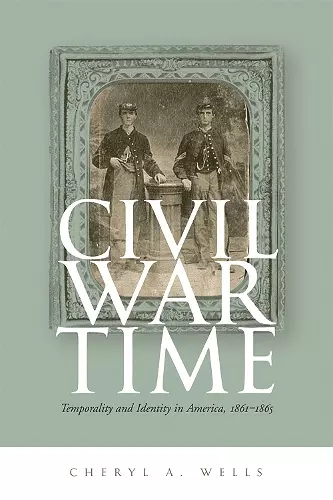Civil War Time
Temporality and Identity in America, 1861-1865
Format:Paperback
Publisher:University of Georgia Press
Published:1st Jun '12
Currently unavailable, our supplier has not provided us a restock date

In antebellum America, both North and South emerged as modernizing, capitalist societies. Work bells, clock towers, and personal timepieces increasingly instilled discipline on one’s day, which already was ordered by religious custom and nature’s rhythms. The Civil War changed that, argues Cheryl A. Wells. Overriding antebellum schedules, war played havoc with people’s perception and use of time. For those closest to the fighting, the war’s effect on time included disrupted patterns of sleep, extended hours of work, conflated hours of leisure, indefinite prison sentences, challenges to the gender order, and desecration of the Sabbath.
Wells calls this phenomenon “battle time.” To create a modern war machine military officers tried to graft the antebellum authority of the clock onto the actual and mental terrain of the Civil War. However, as Wells’s coverage of the Manassas and Gettysburg battles shows, military engagements followed their own logic, often without regard for the discipline imposed by clocks. Wells also looks at how battle time’s effects spilled over into periods of inaction, and she covers not only the experiences of soldiers but also those of nurses, prisoners of war, slaves, and civilians.
After the war, women returned, essentially, to an antebellum temporal world, says Wells. Elsewhere, however, postwar temporalities were complicated as freedmen and planters, and workers and industrialists renegotiated terms of labor within parameters set by the clock and nature. A crucial juncture on America’s path to an ordered relationship to time, the Civil War had an acute effect on the nation’s progress toward a modernity marked by multiple, interpenetrating times largely based on the clock.
Contributes to long-standing historiographical debates. Wells displays a keen mastery of the disparate secondary literature and of the primary source material that serves as the core of this study. This book should appeal to scholars in a number of specialties, including social and military history of the Civil War, and cultural history of nineteenth-century America.
* Mercer University *By defining battle time as a temporality that eroded the authority of God, nature, and the clock itself, Wells has written a book about the Civil War in which multiple and conflicting American timekeeping practices played crucial roles on and off the battlefield. By looking at various spaces—encampments, hospitals, homes, prisons, and battlefields—Wells depicts a war that in its battle-induced chaos put modernity on notice. While battle time ultimately only interrupted, rather than disrupted, the modernizing process initiated during the antebellum period, the interlude is worthy of the painstaking attention. Indeed, Wells's outstanding archival research into an until now neglected topic—timekeeping during the Civil War—distinguishes Civil War Time.
* author of Holy Day, Holiday: The American Sunday *A fascinating study brings to light much about American history, society, and culture since the Civil War.
This richly researched and well-written study adds to the historiography of 'time scholars' and further develops arguments by previous historians dedicated to symbols of modern societies. . . . Wells has put together an important work that investigates battle time and its subsequent aftermath.
Wells has written a commendably short book—sweeping yet succinct, conceptual yet empirical, dense yet readable—on the unexpected but intriguing subject of time consciousness during the Civil War. . . . Civil War Time is a fine addition to the archival study of sensory experience.
[Civil War Time] turns up a lot of fascinating facts . . . the details are absorbing
ISBN: 9780820343426
Dimensions: 229mm x 152mm x 15mm
Weight: 272g
208 pages